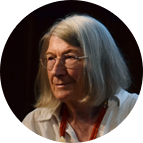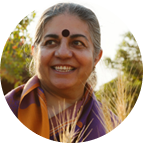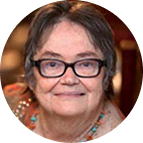Speakers for the Maternal Gift Economy: Breaking Through - Virtual Conference - Nov 27, 2020
Speakers

Darcia Narvaez
Presentation Title: Returning to the Core of Societal Health and Human Potential: Mothering and Nested Care
Historian Marvin Bram described how western civilizations, characterized by hierarchy and patriarchy, gradually reshaped the human mind. Prior to the Sumer civilization and subsequent civilizations, individuals and their societies shifted between polysemy, a multisensory participation in the world, and univocity, a conscious, logical, cause-and-effect analytical thinking used to solve a specific problem. Western history, as Bram tells it, is a story about the suppression of polysemy and the increasing dominance of univocity, paralleling the shift from matrifocal to patriarchal societies.
As societies moved away from matrifocal, egalitarian structures to patriarchal hierarchical structures, human development also shifted. Mothering was devalued and diminished over the millennia, with the USA’s structures and policies today representing perhaps the epitome of its nadir. Consequently, the USA has epidemics of ill health, including depression, loneliness, and violence, accompanied by diminished socioemotional intelligence. Neuroscience can now show the mechanisms of mothering’s effects and the role of epigenetics in shaping children’s health and wellbeing.
Mothering and nurturing are part of human evolution. Humanity evolved a system for the young to optimize normal development, the evolved developmental niche (EDN, aka evolved nest). The EDN is provisioned initially by mothers, expanding to the family and community. For young children, the EDN includes: (1) soothing perinatal experiences; (2) extensive breastfeeding on request; (3) extensive affectionate touch; (4) responsive attention-- prompt and appropriate responses to needs, keeping the young child optimally aroused; (5) multiple allomothers, that is, frequent care by responsive individuals other than mothers (fathers and grandmothers, typically); and (6) multiage self-directed, free play in nature. My colleagues and I demonstrate empirically the importance of each of these components for child and adult wellbeing, sociality and morality. Anthropological studies show us the linkages between the EDN provision and adult personality among small-band hunter-gatherers around the world, such as superior senses, intelligence and social capacities. Communities that provide the EDN are more peaceful, cooperative and egalitarian than communities that do not.
To return to a human mind that moves with nature instead of against it, that is able to participate in the mysteries of a living earth, that is inclusively cooperative instead of stress-reactively othering, we must return to supporting the cores of a healthy society: mothering and EDN provision.
Bio
Darcia Narvaez is Professor Emerita of Psychology at the University of Notre Dame, Fellow of the American Psychological Association and American Educational Research Association. She employs a lifespan, interdisciplinary approach to studying evolved morality, child development and flourishing. She blogs for Psychology Today (“Moral Landscapes”) and hosts the webpage EvolvedNest.org.
Download Darcia Narvaez's transcript

Mary Condren
Presentation Title: The Burnt Offerings of Sacrifice or the Living Gifts of Love
Sacrifice is one of those weasel words that runs freely and unchallenged through political, religious and economic rhetoric, colonising to its nefarious purposes the most noble, generous, loving and idealistic moments of the human spirit, mystifying the horrific atrocities of war and legitimating economic sacrifices in times of capitalist crises. In these realms, sacrificial discourse is transactional rather than relational. It serves the economy of exchange, cultivates indebtedness, and largely serves the sacrificial beneficiaries – the reigning elites. This paper explores why focussing on the gift instead of sacrifice disturbs and challenges dominant discourses, recuperates the practices of gift-giving as primary modes of relationality, and critiques self-sacrifice as a distorted description of the work of women and endorsing female subservience.
Bio
Mary Condren, Th.D is director of Woman Spirit Ireland and a Research Fellow at the Centre for Gender and Women’s Studies in the School of Histories and Humanities at Trinity College Dublin. Her critical work concerns the role of violence and the discourses of sacrifice in contemporary politics. Her constructive work focusses on recuperating the indigenous female traditions of Old Europe in Ireland.
More information @ The Centre for Gender and Women’s Studies and Academia.edu/MaryCondren
Download Mary Condren transcript

Dr. Heide Goettner-Abendroth
Presentation Title: The principles of Sustainable Societies: Matriarchy as an Alternative
Most of the discussions about sustainability are focused on a sustainable economy. The question is not raised, what a sustainable society would look like? Instead it is ignored that the economy is not independent from the form of society. However, in each society the most important factor are humans, for by their way of economy, they are changing the Earth to the greatest part, be it to the better or from bad to worse. It is thus crucial which model of economy and society people have in mind.
Here, we can see the necessary connection between ecology and research on cultures. Today, it is of utmost importance that we learn from sustainable societies, that is, the matriarchal, egalitarian form of society which is based on the maternal gift economy as a sustainable economy. In matriarchal societies the basic group of life: mothers-children-Earth, is respected. This is valid in all existing indigenous matriarchal societies, which lived through millennia in peace with the Earth. Here, motherhood as the basic group of mothers-children-Earth is transformed into a cultural model, which maintains the balance between the genders, the generations, and humans and Nature.
Bio
Dr. Heide Goettner-Abendroth is a mother and a grandmother. She earned her Ph.D. in philosophy of science at the University of Munich where she lectured for ten years (1973-1983).
She has published on philosophy of science, and extensively on matriarchal society and culture, and through her lifelong research on matriarchal societies has become a founder of Modern Matriarchal Studies. In her magnum opus: Matriarchal Societies. Studies on Indigenous Cultures across the Globe, (New York 2013, Peter Lang), she defines scientifically this new field of knowledge and provides a world tour of examples of contemporary matriarchal cultures.
She has been visiting professor at the University of Montreal in Canada, and the University of Innsbruck in Austria. She lectured extensively at home and abroad. In 1986, she founded the “International ACADEMY HAGIA for Matriarchal Studies” in Germany, and since then has been its director.
She guided three World Congresses on Matriarchal Studies: 2003 in Luxembourg, 2005 in Texas, U.S., and 2011 in Switzerland. She received several awards and was twice nominated as candidate for the Nobel Peace Prize, in 2005 by a Swiss initiative, 2007 by a finish initiative.
More information @ www.hagia.de and www.goettner-abendroth.de.
Download Dr. Heide Goettner-Abendroth transcript

Sherri Mitchell – Weh’na Ha’mu Kwasset
Presentation Title: Indigenous Matriarchy and The Gift Economy; Naturally Aligned Systems
The patriarchy has taken away the vital context in which the women are meant to be held…When women are absent, when they are silenced or ignored, the heart based wisdom needed to guide and balance life is missing, and life goes into disharmony. This causes the safety of all to come into question. The patriarchy took the honored roles of the women and handed them to the men, while simultaneously denying the men the benefit of the women’s wisdom, leaving them to walk through life half formed. Without the participation and guidance of the women, our societies became increasingly imbalanced. It is from this imbalanced place that all modern economic systems have emerged. It is time to put the wisdom of the women back into our social systems and use that wisdom to address the gross inequities and injustices that have been created under the capitalist patriarchy. The mother, grandmothers, and aunties have always carried the responsibility of ensuring that everyone had enough, a value that we call alabezu. This eliminated unhealthy competition and jealousy, keeping our communities harmonious and balanced. Here in Waponahkyik, our Nations are matriarchal. It is through our matrifocal ways of being that we have been able to remain intact under 600 years of colonial violence and oppression.
Bio
Sherri Mitchell - Weh’na Ha’mu Kwasset was born and raised on the Penobscot Indian reservation. She received her Juris Doctorate and a certificate in Indigenous People’s Law and Policy from the University of Arizona’s James E. Rogers College of Law. Sherri is an alumna of the American Indian Ambassador program, and the Udall Native American Congressional Internship program. Sherri also received the Mahoney Dunn International Human Rights and Humanitarian Award, for research into Human Rights violations against Indigenous Peoples. She was a longtime advisor to the American Indian Institute’s Healing the Future Program and currently serves as an advisor to the Indigenous Elders and Medicine People’s Council of North and South America. She is the Founding Director of the Land Peace Foundation, an organization dedicated to the global protection of Indigenous rights and the preservation of the Indigenous way of life. Prior to forming the Land Peace Foundation, Sherri served as a law clerk to the Solicitor of the United States Department of Interior; as an Associate with Fredericks, Peebles and Morgan Law Firm; a civil rights educator for the Maine Attorney General’s Office, and; as the Staff Attorney for the Native American Unit of Pine Tree Legal. Sherri is the author of the award-winning book Sacred Instructions; Indigenous Wisdom for Living Spirit-Based Change.
More information @ sacredinstructions.life.

Dr. Vandana Shiva
Presentation Title: Living in times of epidemics and extinction: Remembering that the art of living is the art of giving
I will talk about how capitalist patriarchy has created an extractivist economy which extracts life and value from nature and society. The health emergency, the climate emergency and the extinction crisis are rooted in this extractivist logic.
Nature’s laws and Eco feminist thought are based on the Gift Economy, of giving and sharing.
I will share my work in NAVDANYA on Saving and sharing seeds as part of defending the Gift Economy from the predatory attempt to pirate and patent seeds that nature and women farmers have evolved.
We create abundance, health and prosperity. Corporations create hunger and famines, debt and suicides.
Bio
Dr. Vandana Shiva is trained as a Physicist and did her Ph.D. on the subject “Hidden Variables and Non-locality in Quantum Theory” from the University of Western Ontario in Canada. She later shifted to inter-disciplinary research in science, technology and environmental policy, which she carried out at the Indian Institute of Science and the Indian Institute of Management in Bangalore. In 1982, she founded an independent institute, the Research Foundation for Science, Technology and Ecology in Dehra Dun dedicated to high quality and independent research to address the most significant ecological and social issues of our times, in close partnership with local communities and social movements. In 1991, she founded Navdanya, a national movement to protect the diversity and integrity of living resources, especially native seed, the promotion of organic farming and fair trade. In 2004 she started Bija Vidyapeeth, an international college for sustainable living in Doon Valley in collaboration with Schumacher College, U.K.Dr. Shiva combines the sharp intellectual enquiry with courageous activism..Time Magazine identified Dr. Shiva as an environmental “hero” in 2003 and Asia Week has called her one of the five most powerful communicators of Asia.Forbes magazine in November 2010 has identified Dr. Vandana Shiva as one of the top Seven most Powerful Women on the Globe. Dr. Shiva has received honorary Doctorates from University of Paris, University of Western Ontario, University of Oslo and Connecticut College, University of Guelph.Among her many awards are the Alternative Nobel Prize (Right Livelihood Award, 1993), Order of the Golden Ark, Global 500 Award of UN and Earth Day International Award. Lennon ONO grant for peace award by Yoko Ono in 2009, Sydney Peace Prize in 2010, Doshi Bridgebuilder Award, Calgary Peace Prize and Thomas Merton Award in the year 2011,the Fukuoka Award and The Prism of Reason Award in 2012, the Grifone d’Argento prize 2016 and The MIDORI Prize for Biodiversity 2016, Veerangana Award 2018, The Sanctuary Wildlife Award 2018 and International Environment Summit & Award 2018.
More information @ navdanya.org. Follow Vandana on Twitter @drvandanashiva
Download Dr. Vandana Shiva's transcript

Genevieve Vaughan
Presentation Title: Infinite variations on the theme of the free maternal gift
Unilateral giving and receiving form the basic logical template of communication and community, beginning with the nurturing of young children, which has to be unilateral. This simple but fundamental transitive human action forms a basic theme that is replayed at many levels throughout life, forming the lens through which we understand the world and communicate. Quid pro quo exchange itself is only a variation on the simpler theme, a doubling back, which contradicts the other orientation and forms its own template. Unfortunately, the logic of the gift has been displaced, exploited and hidden by the logic of exchange, while the lens of the gift has been misunderstood, clouded and often completely replaced by patriarchal philosophical speculation. Beginning by revealing and normalizing the primacy of the unilateral gift, we can save it from reframings as exceptional morality, sacrifice, saintliness, religious precept and see how the capitalist patriarchal plunder of the gifts of humans and of Mother Earth has created a generalized culture of death. This ‘narrative’ that puts the free maternal economy at the beginning of all explanations provides a framework in which humans can choose to behave in a way that ensures the benefit of all instead of destroying the planet.
Bio
Genevieve Vaughan (b.1939) is an independent researcher who lives part time in Italy and part in Texas. She created the multicultural all-woman activist Foundation for a Compassionate Society (1987-2005) and the Temple of Sekhmet in the Nevada desert (1992 – ongoing) and she co-created the network: International Feminists for a Gift Economy (2001 – ongoing). Her books are For-Giving, a Feminist Criticism of Exchange (1997), Homo Donans (2006) and The Gift in the Heart of Language: the Maternal Source of Meaning (2015). She has edited Il Dono/The Gift (2004), Women and the Gift Economy (2007) and The Maternal Roots of the Gift Economy (2019). A volume of the Canadian Women’s Studies Journal dedicated to the maternal gift economy has just appeared (2020)
More information @ www.gift-economy.com.
